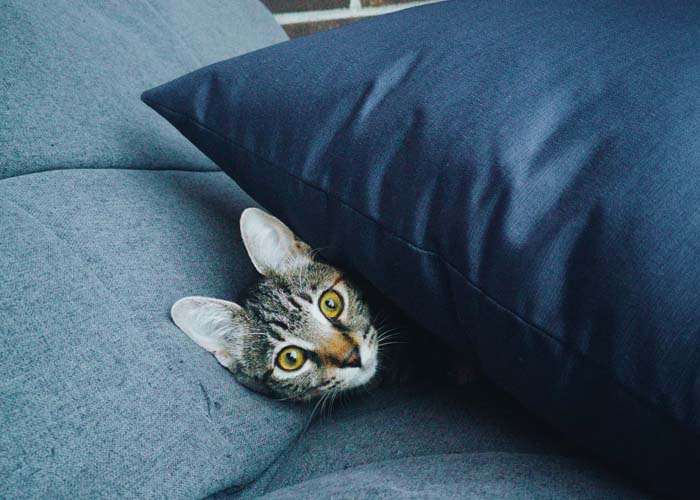Have you ever noticed your cat licking everything in sight? If so, your cat could be suffering from a common but serious medical condition called pica. Pica is a disorder that results in an animal compulsively eating substances not typically regarded as food. This can include things like dirt, pillows, or even laundry detergent!
Although there are many different reasons for this behaviour, some veterinarians believe that the cause of pica in cats is a deficiency of fibre or fat. This blog post will discuss how to diagnose and treat pica so your feline friend can return to being their normal self!
Disclaimer: We are not vets or try to pretend to be if you think something is wrong, contact them. This is just advice we were told and found after the cat started licking the pillow.
Why is my cat obsessed with my pillow?
Your cat is nestled up against you on the pillow, which you’ve turned over to see. Is your cat’s favourite sleeping spot on your pillow? Have you ever wondered why your cat prefers to sleep on your cushion? Perhaps one of the most apparent reasons your cat sleeps on your pillow is because it provides warmth.
Another reason why cats love to sleep on your pillow is to show affection. Typically when we sleep, our head tends to be the most exposed part of our bodies. Cats nuzzle in next to our heads to show their love. It is the prime spot to knead the pillow, purr close to your ear and even get in a lick or two.
Why does my cat lick my bedding?
Cats clean themselves with their tongues frequently. Cats are meticulous. Licking that becomes obsessive or incorporates nonfood objects can be a symptom of an underlying problem, such as a cat licking a blanket or kneading it in her mouth.
why does my cat like to sleep on my pillow?
Cats often choose to sleep on their owner’s pillows for a variety of reasons related to comfort, security, and their natural instincts. Here are some of the most common reasons:
- Scent: Cats are very scent-oriented creatures and are comforted by the familiar smell of their owners. Your pillow carries your scent strongly, making it an appealing place for your cat to relax.
- Warmth: Cats love warm spots, and pillows often retain body heat, making them cozy and inviting for a cat looking for a warm place to snuggle.
- Safety: Sleeping close to you can make your cat feel safer and more secure. By choosing a spot near your head, your cat may feel protected while also keeping a close eye on their surroundings.
- Bonding: Your cat sleeping on your pillow can be a sign of affection and a desire to be close to you. It’s one of the ways cats express their trust and love for their owners.
- Comfort: Pillows are soft and comfortable, providing a plush surface that many cats find irresistible for lounging and sleeping.
- Territoriality: Cats are territorial animals and may claim your pillow as part of their territory. By sleeping on your pillow, they’re mingling their scent with yours, reinforcing their bond with you and marking their territory in a comforting way.
- Routine or Habit: If your cat has slept on your pillow once and found it to be a pleasant experience, they might turn it into a habit. Cats are creatures of habit and tend to return to spots where they’ve felt comfortable in the past.
- High Vantage Point: Depending on the setup of your bed and bedroom, sleeping on the pillow might give your cat a slightly elevated vantage point, allowing them to survey their surroundings more easily.
Understanding these motivations can help you appreciate your cat’s behavior and the comfort they find in being close to you, even if it means sharing your pillow. If you’d prefer your cat not sleep on your pillow, you can encourage them to sleep elsewhere by providing a cozy cat bed near your own bed, using positive reinforcement to make the new spot more appealing.
How can you cure pica in cats?
- Remove targeted objects. The most straightforward approach to address this is to hide your cat’s favourite things, such as clothes, plants, or other items.
- Give your cat something new to chew on.
- Spend time with your cat.
- Make appealing items unappealing.
- Consult a specialist in animal

 Nectar Mattress
Nectar Mattress 


